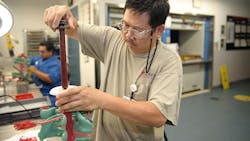2015 IW Best Plants Winner: At DePuy Synthes, Customer Focus Keeps Continuous Improvement at the Forefront
On a recent Tuesday in Raynham, Mass., Jerry, a retired mechanical engineer, stood in front of an assembled group and talked about his knees. Well, that's not entirely correct. He not only stood, but strode about as he spoke, demonstrating with word and deed the return of mobility and reduction in pain he's experienced as a result of two knee implants.
His implants were manufactured by DePuy Synthes, a Johnson & Johnson company, and the group to which Jerry spoke was the operations team at DePuy Synthes' Raynham site. Manufacturing, he told them, is "the last step before the product goes out the door and goes into someone's knees."
Jerry was at DePuy Synthes as part of its Customer Connection program. "It's a reminder that a part we are working on will go into a person," says DePuy Synthes' Sean Sullivan. "We never forget the importance of what we do."
Sullivan is plant manager of the Raynham facility, a 2015 IndustryWeek Best Plants Award winner. The manufacturing plant, which occupies 92,000 square feet of the site, makes orthopedic and neurological implants and instrumentation. It played an integral role in the design, development and manufacture of the Attune Knee System in 2013, and produced more than 180,000 components in support of the launch.
DePuy SynthesRaynham, Mass. Employees: 335, non-union Total Square Footage: 520,000 Primary Product/Market: Orthopedic and neurological implants and instrumentation Start-up Date: 1989 Achievements: 70% reduction in in scrap and rework costs over the past 3 years; 28% decline in in-plant defect rate in the past 3 years; 36% of plant's current production is represented by new or redesigned products introduced in the previous 12 months |
DePuy Synthes' focus on the customer is furthered by its commitment to operational excellence. Fully 100% of the production workforce participates in empowered or self-directed work teams, which translates to a single message: Everybody plays a role in improvement. Moreover, Customer Connection presentations like that provided by Jerry boost employee engagement in ways that are "incalculable," says Jason Moura, business unit manager, foundry, polish and trauma.
The Raynham site's "war room" is perhaps its most visual evidence of the time and attention the team gives to transformational improvement. The space itself is unremarkable. Indeed, it's a little used corridor bookended by temporary walls that can be taken down to allow equipment to be moved in and out of the manufacturing area. "We are masters of space utilization," quips Sullivan.
Nearly every available space in that room is papered with projects in motion, following Raynham's OpEx DMAIC framework for continuous improvement. These aren't "quick hit" efforts, although DePuy Synthes pursues plenty of those, but instead projects initiated to deliver significant process step changes to specific areas of the value chain.
On a recent day, for example, a visitor to the war room would have observed a project in progress to improve flow between the foundry and femur finishing, with six different layouts under evaluation and a goal of reducing inventory and improving lead time by significant measures. Transformational projects such as these are staffed with dedicated teams that meet for approximately half a day for three to four months. The leadership team is updated weekly.
"It's a rigorous process, but it's rigorous for a reason," says Moura.
On the quality front, DePuy Synthes participates in a Johnson & Johnson program called "Do It Right," which details a series of pillars and practices in which sites must show deployment and maturity. The Raynham facility is a benchmark site for two practices, Gemba and Leader as a Role Model. The Raynham site has adopted a servant leader approach in support of the latter practice.
"We are there to serve [the associates]," says Sullivan. It's about "how can I help you do your job better?"
About the Author
Jill Jusko
Bio: Jill Jusko is executive editor for IndustryWeek. She has been writing about manufacturing operations leadership for more than 20 years. Her coverage spotlights companies that are in pursuit of world-class results in quality, productivity, cost and other benchmarks by implementing the latest continuous improvement and lean/Six-Sigma strategies. Jill also coordinates IndustryWeek’s Best Plants Awards Program, which annually salutes the leading manufacturing facilities in North America.
Have a story idea? Send it to [email protected].

